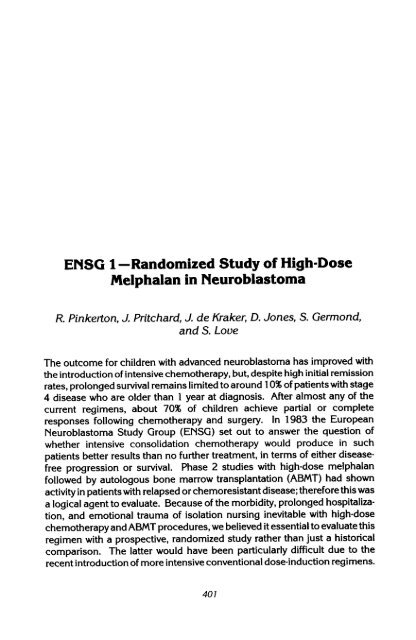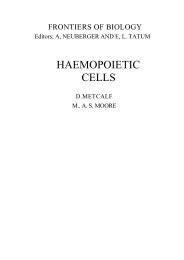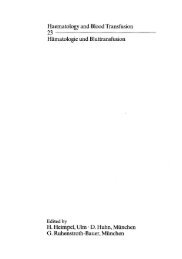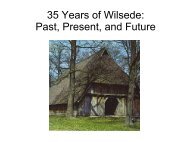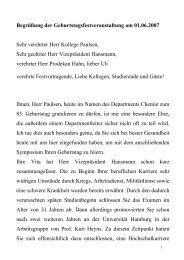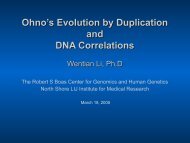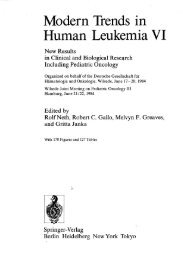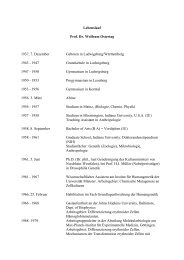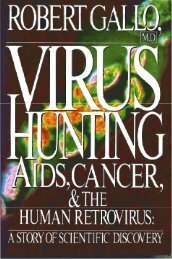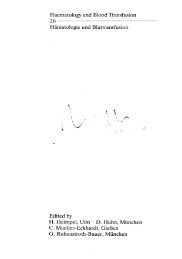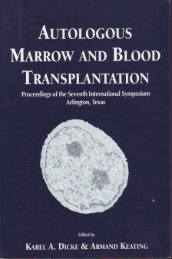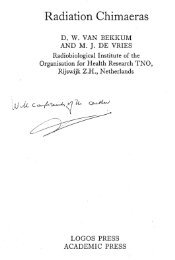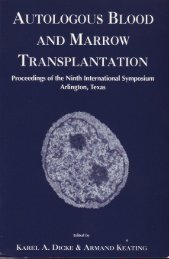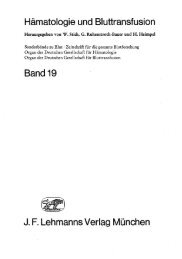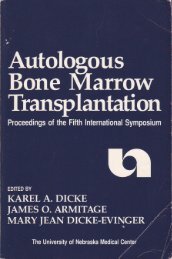- Page 1:
Autologous Bone Marrow Transplantat
- Page 5 and 6:
Autologous Bone Marrow Transplantat
- Page 7:
To our colleagues, Drs. R. Lee Clar
- Page 10 and 11:
via ABMT Autologous Bone Marrow Tra
- Page 12 and 13:
X ABMT Pharmacological Manipulation
- Page 14 and 15:
XII ABMT C. INTERNATIONAL RANDOMIZE
- Page 16 and 17:
xiu ABMT Session IV - Breast Cancer
- Page 18 and 19:
xui ABMT Panel Discussion: Session
- Page 20 and 21:
xuiii ABMT Effect of Interleukin 2
- Page 23:
Acknowledgments The publication of
- Page 27 and 28:
Autologous Bone Marrow Transplantat
- Page 29 and 30:
AML in First Remission 5 performed
- Page 31:
AML in First Remission 7 than 50% o
- Page 34 and 35:
10 BAVC + ABMT in Patients With AML
- Page 36 and 37:
BAVC + ABMT in Patients With AML in
- Page 38 and 39:
14 BAVC + ABMTin Patients With AML
- Page 40 and 41:
16 Purged ABMT in CR of Acute Leuke
- Page 42 and 43:
18 Purged ABMT in CR of Acute Leuke
- Page 44 and 45:
20 Purged ABMT in CR of Acute Leuke
- Page 46 and 47:
22 Purged ABMT in CR of Acute Leuke
- Page 48 and 49:
24 First-Remission Autograft forAML
- Page 50 and 51:
26 First-Remission Autograft forAML
- Page 52 and 53:
28 First-Remission Autograft forAML
- Page 55 and 56:
Autologous Bone Marrow Transplantat
- Page 57:
Transplantation in CRI AML 33 DISCU
- Page 60 and 61:
36 ABMT in ALL compared the results
- Page 62 and 63:
38 ABMT in ALL were administered un
- Page 64 and 65:
40 ABMT in ALL CR1 patients receive
- Page 66 and 67:
42 ABMT in ALL 19. Rizzoli V, Mango
- Page 68 and 69:
44 ABMTin CRI program in CR1 is the
- Page 70 and 71:
46 ABMTin CRI RESULTS The AML inves
- Page 73 and 74:
Leukemia: First Remission K A. Dick
- Page 75 and 76:
Panel Discussion: Session IA 51 DR.
- Page 77:
IB. Clinical Studies in Second- or
- Page 80 and 81:
56 ABMTIn CR2 RESULTS OF VARIOUS TR
- Page 82 and 83:
58 ABMTIn CR2 antibodies; for non-T
- Page 84 and 85:
60 ABMT in Acute Nonlymphocytic Leu
- Page 86 and 87:
62 ABMT in Acute Nonlymphocytic Leu
- Page 88 and 89:
64 ABMT in Acute Nonlymphocytic Leu
- Page 90 and 91:
66 ABMT in Acute Nonlymphocytic Leu
- Page 92 and 93:
68 ABMT in Acute Nonlymphocytic Leu
- Page 94 and 95:
70 ABMT in AML With Monoclonal Anti
- Page 96 and 97:
72 ABMT in AML With Monoclonal Anti
- Page 98 and 99:
74 ABMT in AML With Monoclonal Anti
- Page 100 and 101:
76 ABMT in AML With Monoclonal Anti
- Page 102 and 103:
78 ABMT in AML With Monoclonal Anti
- Page 104 and 105:
80 Mafosfamide Purging in Leukemia
- Page 106 and 107:
82 Mafosfamide Purging in Leukemia
- Page 108 and 109:
84 Mafosfamide Purging in Leukemia
- Page 110 and 111:
86 Mafosfamide Purging in Leukemia
- Page 113 and 114:
Autologous Bone Marrow Transplantat
- Page 115 and 116:
ABMT in CR2 Pediatric ALL 91 follow
- Page 117 and 118:
Ex Vivo Use of Monoclonal Antibodie
- Page 119 and 120:
Ex Vivo Marrow Purging 95 Table 1.
- Page 121 and 122:
De Viuo Marrow Purging 97 WBC-f- AN
- Page 123 and 124:
Conditioning Regimens Before Bone M
- Page 125 and 126:
Conditioning Regimens in AML 101 Le
- Page 127:
Conditioning Regimens in AML 103 co
- Page 130 and 131:
106 Double (Jnpurged ABMT in Leukem
- Page 132 and 133:
108 Double Unpurged ABMT in Leukemi
- Page 134 and 135:
770 Double (Jnpurged ABMT in Leukem
- Page 136 and 137:
7/2 Double Autografting in Acute Le
- Page 138 and 139:
114 Double Autografting in Acute Le
- Page 140 and 141:
116 Double Autografting in Acute Le
- Page 142 and 143:
118 Double Autografting in Acute Le
- Page 144 and 145:
120 Recovery After 4-Hydroperoxycyc
- Page 146 and 147:
122 Recovery After 4-Hydroperoxycyc
- Page 149 and 150:
Autologous Bone Marrow Transplantat
- Page 151 and 152:
Panel Discussion: Session IB 127 di
- Page 153:
Panel Discussion: Session IB 129 tu
- Page 157 and 158:
Magnetic Affinity Colloid Eliminati
- Page 159 and 160:
Magnetic Separation of Marrow Cells
- Page 161 and 162:
Magnetic Separation of Marrow Cells
- Page 163 and 164:
*r r- r» u. >>• O S ^ CO ai a> C
- Page 165 and 166:
Magnetic Separation of Marrow Cells
- Page 167 and 168:
4-Hydroperoxycyclophosphamide and V
- Page 169 and 170:
Chemopurging 145 incubation, the ce
- Page 171 and 172:
Chemopurging 147 To date, four pati
- Page 173 and 174:
Chemopurging 149 4-HC + VCR IC75 AM
- Page 175 and 176:
Decontaminating Bone Marrow With Me
- Page 177 and 178:
Merocyanine 540 Marrow Decontaminat
- Page 179 and 180:
Merocyanine 540 Marrow Decontaminat
- Page 181 and 182:
CALLA-Negative Clonogenic Cultures
- Page 183 and 184:
CALLA-Negatiœ Clonogenic BCell ALL
- Page 185:
CALLA-Negative Clonogenic BCell ALL
- Page 188 and 189:
164 Acetaldophosphamide Ex Vivo Che
- Page 190 and 191:
766 Acetaldophosphamide Ex Vivo Che
- Page 192 and 193:
168 Acetaldophosphamide Ex Viuo Che
- Page 195 and 196:
Detecting Residual Disease in Bone
- Page 197 and 198:
Detecting Residual Disease in Bone
- Page 199:
Detecting Residual Disease in Bone
- Page 202 and 203:
178 Pharmacological Manipulation an
- Page 204 and 205:
180 Pharmacological Manipulation an
- Page 206 and 207:
182 Pharmacological Manipulation an
- Page 208 and 209:
784 Pharmacological Manipulation an
- Page 211:
ID. Chronic Myelogenous Leukemia
- Page 214 and 215:
190 CML Chronic Phase Autografting
- Page 216 and 217:
792 CML Chronic Phase Autografting
- Page 218 and 219:
194 CML Chronic Phase Autografting
- Page 220 and 221:
196 CML Blast Crisis Autografting e
- Page 223 and 224:
Autologous Transplantation of Phila
- Page 225 and 226:
Autografting in Chronic Granulocyti
- Page 227:
Autografting in Chronic Granulocyti
- Page 230 and 231:
206 Panel Discussion: Session ID DR
- Page 233 and 234:
Natural History of Relapsed Hodgkin
- Page 235 and 236:
ABMT in Hodgkin's Disease 211 50%.
- Page 237 and 238:
ABMTin Hodgkin, 's Disease 213 (62%
- Page 239 and 240:
ABMT in Hodgkin's Disease 215 LLLLL
- Page 241 and 242:
Updated Results of CBV and Autologo
- Page 243 and 244:
CBV and ABMT in Hodgkin's Disease 2
- Page 245:
CBV and ABMT in Hodgkin 's Disease
- Page 248 and 249:
224 Chemotherapy and ABMT in Hodgki
- Page 250 and 251:
226 Chemotherapy and ABMTin Hodgkin
- Page 252 and 253:
228 Chemotherapy and ABMT in Hodgki
- Page 254 and 255:
230 Chemotherapy and ABMT in Hodgki
- Page 256 and 257:
232 ABMT for Advanced Hodgkin's Dis
- Page 258 and 259:
234 ABMTfor Advanced Hodgkin's Dise
- Page 261 and 262:
Hodgkin's Disease J. O. Armitage an
- Page 263 and 264:
Panel Discussion: Session IIA 239 D
- Page 265:
IIB. Non-Hodgkin's Lymphoma
- Page 268 and 269:
244 Salvage Chemotherapy for Lympho
- Page 270 and 271:
246 Salvage Chemotherapy for Lympho
- Page 273 and 274:
Autologous Bone Marrow Transplantat
- Page 275 and 276:
ABMT in Burkitt's Lymphoma 251 Tabl
- Page 277 and 278:
ABMT in Burkitt's Lymphoma 253 medi
- Page 279 and 280:
ABMT in Burkitt's Lymphoma 255 Heal
- Page 281 and 282:
ABMT in Burkitt's Lymphoma 257 •
- Page 283 and 284:
ABMT in Burkitt's Lymphoma 259 init
- Page 285:
ABMT in Burkitt's Lymphoma 261 11.
- Page 288 and 289:
264 Myeloma Biology and Therapy hig
- Page 290 and 291:
266 Myeloma Biology and Therapy mon
- Page 292 and 293:
265 Myeloma Biology and Therapy 5.
- Page 294 and 295:
270 BMT in Relapsed Diffuse Large C
- Page 296 and 297:
272 BMT in Relapsed Diffuse Large C
- Page 298 and 299:
274 BMT in Relapsed Diffuse Large C
- Page 300 and 301:
276 Transplantation for Malignant L
- Page 303 and 304:
Optimum Timing of Autologous Bone M
- Page 305 and 306:
ABMT Timing in Lymphoma 281 PATIENT
- Page 307 and 308:
3 o + + + + o LO T— T— LO co Tf
- Page 309 and 310:
ABMT Timing in Lymphoma 285 RESULTS
- Page 311 and 312:
co co I I I I I I I I I I 2 2 2 CD
- Page 313 and 314:
ABMT Timing in Lymphoma 289 Median
- Page 315 and 316:
ABMT Timing in Lymphoma 291 in a mi
- Page 317 and 318:
ABMT Timing in Lymphoma 293 Develop
- Page 319:
ABMT Timing in Lymphoma 295 53. Sto
- Page 322 and 323:
298 Treatment Strategies for NHL PA
- Page 324 and 325:
300 Treatment Strategies for NHL 10
- Page 326 and 327:
302 Treatment Strategies for NHL 2)
- Page 328 and 329:
304 Treatment Strategies for NHL al
- Page 330 and 331:
306 Treatment Strategies for NHL 31
- Page 332 and 333:
308 Panel Discussion: Session IIB m
- Page 335:
IIC. International Randomized Study
- Page 338 and 339:
314 Proposed International Adult Ly
- Page 340 and 341:
316 Proposed International Adult Ly
- Page 342 and 343:
318 Proposed International Adult Ly
- Page 344 and 345:
320 Proposed International Adult Ly
- Page 346 and 347:
322 Proposed International Adult Ly
- Page 348 and 349:
324 Proposed International Adult Ly
- Page 350 and 351:
326 Proposed International Adult Ly
- Page 352 and 353:
328 Proposed International Adult Ly
- Page 354 and 355:
330 Proposed International Adult Ly
- Page 356 and 357:
332 Proposed International Adult Ly
- Page 359 and 360:
International Randomized Trial in N
- Page 361 and 362:
International NHL Trial 337 dispari
- Page 363 and 364:
International NHL Trial 339 cannot
- Page 365 and 366:
International NHL Trial 341 ORGANIZ
- Page 367 and 368:
Lymphoma T. Philip and G. Spitzer,
- Page 369:
IID. Purging and Detection
- Page 372 and 373:
348 Chemoimmunoseparation of T Lymp
- Page 374 and 375: 350 Chemoimmunoseparation of T Lymp
- Page 376 and 377: 352 Burkitt's Lymphoma Purging Assa
- Page 378 and 379: 354 Burkitts Lymphoma Purging Assay
- Page 380 and 381: 356 Burkitt's Lymphoma Purging Assa
- Page 382 and 383: 358 Burkitts Lymphoma Purging Assay
- Page 384 and 385: 360 Purging Methods in Burkitt's Ly
- Page 386 and 387: 362 Purging Methods in Burkitt's Ly
- Page 388 and 389: 364 Purging Methods in Burkitt's Ly
- Page 390 and 391: 366 Leukemia Cell Sensitivity to Im
- Page 392 and 393: 368 Leukemia Cell Sensitivity to Im
- Page 394 and 395: 370 Leukemia Cell Sensitiuity to Im
- Page 396 and 397: 372 Panel Discussion: Session IID D
- Page 399 and 400: Autologous Bone Marrow Transplantat
- Page 401 and 402: ABMTfor Neuroblastoma 377 sedimenta
- Page 403 and 404: ABMT for Neuroblastoma 379 EX VIVO
- Page 405 and 406: ABMTfor Neuroblastoma 381 PATIENTS
- Page 407 and 408: Repeated High-Dose Chemotherapy Fol
- Page 409 and 410: ABMT in Metastatic Neuroblastoma 38
- Page 411 and 412: ABMT in Metastatic Neuroblastoma 38
- Page 413 and 414: ABMT in Metastatic Neuroblastoma 38
- Page 415: ABMT in Metastatic neuroblastoma 39
- Page 418 and 419: 394 Clnpurged ABMTfor Neuroblastoma
- Page 420 and 421: 396 Unpurged ABMTfor Neuroblastoma
- Page 422 and 423: 398 Unpurged ABMTfor Neuroblastoma
- Page 426 and 427: 402 High-Dose Melphalan in Neurobla
- Page 428 and 429: 404 High-Dose Melphalan in Neurobla
- Page 431 and 432: Bone Marrow Transplantation in an C
- Page 433 and 434: ABMT in 65 Patients With Neuroblast
- Page 435 and 436: ABMT in 65 Patients With Neuroblast
- Page 437 and 438: ABMT in 65 Patients With Neuroblast
- Page 439 and 440: ABMTin 65 Patients With Neuroblasto
- Page 441: ABMTin 65 Patients With Neuroblasto
- Page 444 and 445: 420 ABMT in Neuroblastoma Group 2
- Page 446 and 447: 422 ABMT in Neuroblastoma RESULTS A
- Page 449 and 450: Transplantation for Neuroblastoma U
- Page 451 and 452: Purged Marrow Engraftment in Neurob
- Page 453 and 454: Purged Marrow Engraftment in Neurob
- Page 455: Purged Marrow Engraftment in Neurob
- Page 458 and 459: s o o o i o i - w n . t t i s T - T
- Page 460 and 461: 436 Digital Image Analysis System a
- Page 462 and 463: 438 Digital Image Analysis System T
- Page 464 and 465: 440 Digital Image Analysis System u
- Page 467 and 468: Eliminating Burkitt's Cells From Ex
- Page 469 and 470: Immunomagnetic Purging ofBurkitt's
- Page 471 and 472: Immunomagnetic Purging ofBurkitt's
- Page 473 and 474: Neuroblastoma T. Philip and C. P. R
- Page 475 and 476:
Panel Discussion: Session 111 451 w
- Page 477:
IV. Breast Cancer
- Page 480 and 481:
456 High-Dose Chemotherapy and ABMT
- Page 482 and 483:
458 High-Dose Chemotherapy and ABMT
- Page 484 and 485:
460 High-Dose Chemotherapy and ABMT
- Page 486 and 487:
462 High-Dose Chemotherapy and ABMT
- Page 489 and 490:
Strategies in the Treatment of Brea
- Page 491 and 492:
Treatment Strategies in Breast Canc
- Page 493 and 494:
Treatment Strategies in Breast Canc
- Page 495 and 496:
Treatment Strategies in Breast Canc
- Page 497 and 498:
Treatment Strategies in Breast Canc
- Page 499 and 500:
Phase I and II Studies of High-Dose
- Page 501 and 502:
a « O 75 o c Ü co s g c .2 — o
- Page 503 and 504:
+ O CM CD CM CO CO O O CM O CM CM 8
- Page 505 and 506:
High-Dose Chemotherapy and Autologo
- Page 507 and 508:
High-Dose Therapy and ABMT in Breas
- Page 509 and 510:
Immunodetection of Breast Carcinoma
- Page 511:
Immunodetection of Breast Carcinoma
- Page 514 and 515:
490 ABMTfor Breast Cancer initial s
- Page 516 and 517:
492 ABMT for Breast Cancer agent gr
- Page 518 and 519:
494 ABMT for Breast Cancer approach
- Page 521 and 522:
Detection of Occult Breast Cancer C
- Page 523 and 524:
Occult Breast Cancer Cells in Marro
- Page 525 and 526:
Occult Breast Cancer Cells in Marro
- Page 527 and 528:
Breast Cancer E. Frei III and R. Ba
- Page 529 and 530:
Panel Discussion: Session IV 505 DR
- Page 531:
V. Lung Cancer
- Page 534 and 535:
570 Tumor Cell Detection MATERIAL A
- Page 536 and 537:
512 Tumor Cell Detection Table 3. I
- Page 539 and 540:
High-Dose Etoposide and Cisplatin W
- Page 541 and 542:
Etoposide and Cisplatin for Lung Ca
- Page 543 and 544:
Etoposide and Cisplatin for Lung Ca
- Page 545:
Etoposide and Cisplatin for Lung Ca
- Page 548 and 549:
524 Panel Discussion: Session V to
- Page 550 and 551:
526 Panel Discussion: Session V sma
- Page 553:
VI. Melanoma/Sarcoma/Carcinoma
- Page 556 and 557:
532 ABMT in Melanoma chemotherapy a
- Page 558 and 559:
534 ABMT in Melanoma Table 2. Effec
- Page 560 and 561:
536 ABMT in Melanoma with either si
- Page 562 and 563:
538 Panel Discussion: Session VI ca
- Page 564 and 565:
540 Panel Discussion: Session VI sa
- Page 567 and 568:
Intensive Monochemotherapy With Car
- Page 569 and 570:
Carmustine and ABMTfor Malignant Gl
- Page 571:
Carmustine andABMTfor Malignant Gli
- Page 574 and 575:
550 High-Dose Carmustine and Transp
- Page 576 and 577:
552 High-Dose Carmustine and Transp
- Page 578 and 579:
554 High-Dose Carmustine and Transp
- Page 580 and 581:
556 High-Dose Carmustine and Transp
- Page 582 and 583:
558 High-Dose Therapy of CHS Glioma
- Page 584 and 585:
560 High-Dose Therapy of CHS Glioma
- Page 586 and 587:
562 High-Dose Therapy of CHS Glioma
- Page 589 and 590:
Brain Cancer S. Wolff and G. Herzig
- Page 591:
Panel Discussion: Session VII 567 D
- Page 595 and 596:
Intensification Regimens for Autolo
- Page 597 and 598:
Clinical Intensification Regimens f
- Page 599 and 600:
c « O) o in CM -r 1 •«t 00 i -
- Page 601 and 602:
Clinical Intensification Regimens f
- Page 603:
Clinical Intensification Regimens f
- Page 606 and 607:
582 Busulfan + Cyclophosphamide in
- Page 608 and 609:
Busulfan + Cyclophosphamide in Chil
- Page 610 and 611:
586 Busulfan + Cyclophosphamide in
- Page 612 and 613:
588 Busulfan + Cyclophosphamide in
- Page 614 and 615:
590 Intensive use of Carmustine Pul
- Page 617 and 618:
A Phase II Study of a New Cytoreduc
- Page 619 and 620:
BEAM: Cytoreductiue Regimen for Lym
- Page 621 and 622:
BEAM: Cytoreductiue Regimen for Lym
- Page 623 and 624:
BEAM: Cytoreductlue Regimen for Lym
- Page 625 and 626:
Total Body Irradiation, High-Dose C
- Page 627 and 628:
Total Body Irradiation, Cytarabine,
- Page 629 and 630:
New Regimens K. Antman and M. Syman
- Page 631:
IX. Supportive Therapy
- Page 634 and 635:
670 Herpesvirus Infections Table 1.
- Page 636 and 637:
612 Herpesvirus Infections Table 3.
- Page 639 and 640:
Autologous Blood Stem Cell Transpla
- Page 641 and 642:
Peripheral Stem Cell Transplantatio
- Page 643 and 644:
Peripheral Stem Cell Transplantatio
- Page 645 and 646:
Peripheral Stem Cell Transplantatio
- Page 647 and 648:
Peripheral Stem Cell Transplantatio
- Page 649 and 650:
a c CO TO O O S E => CO "O CO i- t
- Page 651 and 652:
3 w •o « C C o ü ü CD < , o E
- Page 653 and 654:
Peripheral Stem Cell Transplantatio
- Page 655 and 656:
Peripheral Stem Cell Transplantatio
- Page 657 and 658:
Toxic Deaths After Autologous Bone
- Page 659 and 660:
Toxic Deaths in ABMT 635 RESULTS Fi
- Page 661 and 662:
Toxic Deaths in ABMT 63 7 Patient/
- Page 663 and 664:
Infectious Complications of Autolog
- Page 665 and 666:
Infectious Complications of ABMT Ta
- Page 667 and 668:
Infectious Complications ofABMT 643
- Page 669:
Infectious Complications ofABMT 645
- Page 672 and 673:
648 Infections in ABMT MATERIAL AND
- Page 674 and 675:
650 Infections in ABMT Category Tab
- Page 676 and 677:
652 Infections in ABMT been found,
- Page 678 and 679:
654 Antibiotics in Cancer Patients
- Page 680 and 681:
656 Antibiotics in Cancer Patients
- Page 683 and 684:
The Empiric Use of Amphotericin B f
- Page 685 and 686:
Amphotericin B for Neutropenie Feue
- Page 687 and 688:
Amphotericin B for Neutropenie Feve
- Page 689 and 690:
The Role of Intravenous Immune Glob
- Page 691 and 692:
Mg in ABMT 667 broken down; antigen
- Page 693 and 694:
The Possible Therapeutic Value of N
- Page 695 and 696:
Natural Killer Cells and Transplant
- Page 697:
Natural Killer Cells and Transplant
- Page 700:
676 Transplantation of Circulating
- Page 703:
Transplantation of Circulating Stem
- Page 706 and 707:
682 Peripheral Stem Cell Transplant
- Page 708 and 709:
684 Peripheral Stem Cell Transplant
- Page 711 and 712:
Autologous Transplantation Using Pe
- Page 713 and 714:
Peripheral Blood Stem Cell Transpla
- Page 715 and 716:
Peripheral Blood Stem Cell Transpla
- Page 717 and 718:
Bronchoscopic Examination and Bronc
- Page 719 and 720:
Bronchoscopy in Marrow Transplantat
- Page 721 and 722:
Effect of Interleukin 2 on T Lympho
- Page 723 and 724:
c c 4) "5 Q. Ss •o 3 35 (A U «5
- Page 725 and 726:
T Lymphocyte CFU After ABMT 701 Six
- Page 727:
T Lymphocyte CFCJ After ABMT 703 no
- Page 730 and 731:
706 Panel Discussion: Session IX se
- Page 733 and 734:
Expression of Human Adenosine Deami
- Page 735 and 736:
Human ADA in Monkeys 711 to the SAX
- Page 737 and 738:
Human ADA in Monkeys 713 4 were nev
- Page 739 and 740:
Human ADA in Monkeys 715 tuted marr
- Page 741 and 742:
Electric Field-Mediated DNA Transfe
- Page 743 and 744:
Electric Field-Mediated DNA Transfe
- Page 745:
Electric Field-Mediated DNA Transfe
- Page 748 and 749:
724 Aberrant Gene Expression in AML
- Page 750 and 751:
726 Aberrant Gene Expression in AML
- Page 752 and 753:
728 Aberrant Gene Expression in AML
- Page 755 and 756:
Clonal Detection of Remission by Re
- Page 757 and 758:
Clonal Detection of Remission 733 c
- Page 759 and 760:
Clonal Detection of Remission 3 735
- Page 761:
XI. Summary
- Page 764 and 765:
740 Summary administration of the a
- Page 766 and 767:
742 Summary particularly apparent i
- Page 768 and 769:
744 Summary limited occurrence of t
- Page 771 and 772:
Concluding Remarks Karel A. Dicke I
- Page 773 and 774:
Contributors and Participants Zora
- Page 775 and 776:
Contributors and Participants 751 M
- Page 777 and 778:
Contributors and Participants 753 A
- Page 779 and 780:
Contributors and Participants 755 R
- Page 781 and 782:
Contributors and Participants 757 M
- Page 783 and 784:
Contributors and Participants Leona
- Page 785 and 786:
Contributors and Participants 761 L
- Page 787 and 788:
Contributors and Participants 763 B
- Page 789 and 790:
Contributors and Participants 765 J
- Page 791 and 792:
Contributors and Participants 767 L
- Page 793 and 794:
Contributors and Participants 769 B
- Page 795 and 796:
Contributors and Participants 771 G
- Page 797 and 798:
Contributors and Participants 773 A
- Page 799 and 800:
Contributors and Participants 775 L


